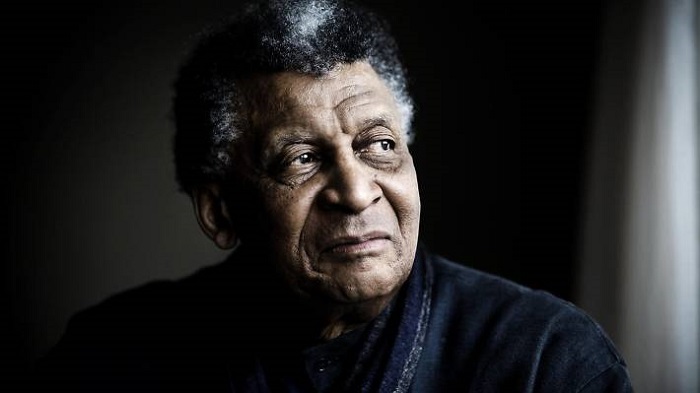
2016 in a moment, Blue Bolero sprung into view, unforced like a serene vision.
A man came on to a stage, touched the piano and left. Moments later, that touch completed a smile of recognition as we in the audience having momentarily sat in darkness saw what he did, the surprise in his eyes, and gently laughed at the ritual.
Abdullah Ibrahim, above, then came on and approached the Fazioli that night at the Barbican, its castors gleaming. Now in his early-eighties, dressed in black, his clothes loose and comfortable-looking, his hair grey, mien dignified, began to play. A hymn of concentration, the sheet music in front of him a little irrelevant, later some of it even fell on to the floor to no obvious disruption, because this was pure improvisation and an assembling once more of a lifetime of music with a few cues from the few staves there happened to be on the paper representing the roux, the essence, Ibrahim’s Ellingtonian body of work and artistry more to the point in his head and in his heart. The themes were fragmentary, musical sentences begun, sometimes left dangling in a creative ellipsis, elite noodling perhaps if you were being uncharitable, otherwise that bravest of things: naked thought as a musician in front of a few thousand people as witnesses with no safety net available, expressing himself and somehow holding a hall taut in his hands.
Ibrahim didn’t speak at all and none of the tunes were announced. One theme, a thing of beauty, ‘Blue Bolero’, returned a few times within the first improvisation, the repetition a charm and besides this there were echoes of Monk particularly. Later in the second section ‘The Wedding’ was given considered space, its processional quality a mirror and a light in the sky. Ibrahim has a language at his disposal and is the keeper of his own dictionary, a reference work for the generations who stand on his shoulders. Listen. “And so it is with our own past. It is a labour in vain to attempt to recapture it: all the efforts of our intellect must prove futile. The past is hidden somewhere outside the realm, beyond the reach of intellect, in some material object (in the sensation which that material object will give us) which we do not suspect. And as for that object, it depends on chance whether we come upon it or not before we ourselves must die” — Proust